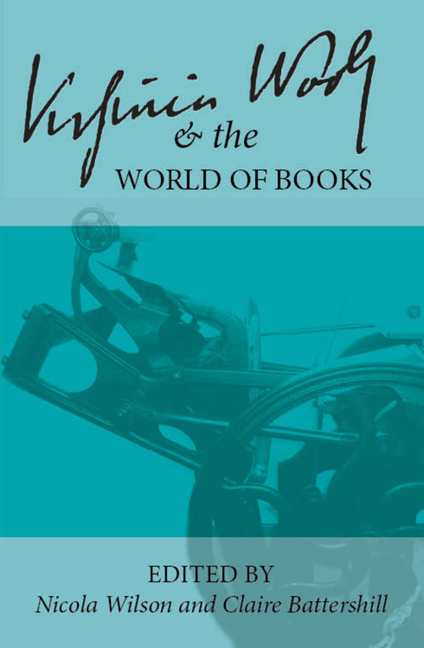 Virginia Woolf and the World of Books
Virginia Woolf and the World of Books Book contents
- Frontmatter
- Contents
- Introduction
- List of Abbreviations
- Keynote
- In the Archives
- Craftsmanship
- The Hogarth Press
- Hours in A Library
- The Art of the Book
- The Art of the Narrative
- Making New Books: Creative Approaches
- The Book in the World: Woolf's Global Reception
- Editing and Teaching Woolf
- Intertextuality
- Virginia Woolf's Appreciation for Walt Whitman's Leaves of Grass: Book Making/Reading, Intimacy, Collectivity
- Reading Intercultural, Intergenerational and Intertextual Woolf: Virginia Woolf's “The Lady in the Looking-Glass,” Oscar Wilde's “The Sphinx without a Secret,” and Lady Murasaki's Yugao
- To “write about Mrs Lindbergh”: Woolf, Flight, and Anne Morrow Lindbergh's North to the Orient
- Lives in Writing
- Notes on Contributors
Virginia Woolf's Appreciation for Walt Whitman's Leaves of Grass: Book Making/Reading, Intimacy, Collectivity
from Intertextuality
- Frontmatter
- Contents
- Introduction
- List of Abbreviations
- Keynote
- In the Archives
- Craftsmanship
- The Hogarth Press
- Hours in A Library
- The Art of the Book
- The Art of the Narrative
- Making New Books: Creative Approaches
- The Book in the World: Woolf's Global Reception
- Editing and Teaching Woolf
- Intertextuality
- Virginia Woolf's Appreciation for Walt Whitman's Leaves of Grass: Book Making/Reading, Intimacy, Collectivity
- Reading Intercultural, Intergenerational and Intertextual Woolf: Virginia Woolf's “The Lady in the Looking-Glass,” Oscar Wilde's “The Sphinx without a Secret,” and Lady Murasaki's Yugao
- To “write about Mrs Lindbergh”: Woolf, Flight, and Anne Morrow Lindbergh's North to the Orient
- Lives in Writing
- Notes on Contributors
Summary
In The Waves (1931), likely Virginia Woolf 's most poetic work, some phrases seem to echo not only Walt Whitman's language but also his sense of collective identity expressed in poems such as “Song of Myself.” Terence Hewet also reads aloud from Whitman in The Voyage Out (1915), leading the inquisitive reader to wonder about Woolf 's interest in the poet. While Woolf 's diaries and letters offer very few clues, her essays reveal that Woolf upheld Whitman as a model of a truly great and pioneering author. In three essays written in the years following The Voyage Out, Woolf references Whitman. In “Mr Symons's Essays” (1916), she presents Whitman as a cure-all for writers intent only on producing “fine words with the semblance of beauty on them” (E2 69). In “Melodious Meditations” (1917), she writes of American literature that “there is nothing to blush at in the whole of it, except perhaps Walt Whitman” (80) and later continues, in surprisingly unreserved praise:
if any one is sceptical as to the future of American art let him read Walt Whitman's preface to the first edition of Leaves of Grass. As a piece of writing it rivals anything we have done for a hundred years, and as a statement of the American spirit no finer banner was ever unfurled for the young of a great country to march under… (81–82)
In 1918, Woolf 's enthusiasm for the poet continues in her review of Johnston and Wallace's Visits to Walt Whitman. Here she seems charmed by the authors’ descriptions of Whitman appearing like a “retired farmer” and “at pains to bring his common humanity to the forefront” (206). She is also captivated by the “flame of the spirit” of Whitman's circle of readers (205). Melba Cuddy-Keane has written that these Whitman scholars likely seemed to Woolf, especially during wartime, “a model of community” (42). Woolf 's own admiration for the poet shines through when she adds: “In Whitman the capacity for pleasure seemed never to diminish, and the power to include grew greater and greater” (207).
These direct allusions to Whitman, all from 1915–1918, cluster around Woolf's first published novel and the founding of the Hogarth Press.
- Type
- Chapter
- Information
- Virginia Woolf and the World of BooksSelected Papers from the Twenty-seventh Annual International Conference on Virginia Woolf, pp. 254 - 259Publisher: Liverpool University PressPrint publication year: 2018
